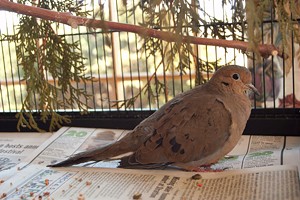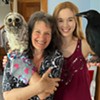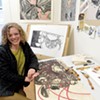Published March 23, 2011 at 8:48 a.m.
Plenty of Vermont artisans make note cards that feature their pets or other domesticated animals. The sly-looking cats and dogs of Montpelier-based Anne Davis of Anne Made Cards and those luminous watercolor roosters by Annelein Beukenkamp of Burlington come to mind.
Ellen Jareckie, 51, of House-Mouse Designs has shyer subjects: She paints detailed drawings of young wildlife. Her greeting cards, rubber stamps, mugs and other merch depict baby field mice, squirrels and opossums crawling out of jack-o’-lanterns, falling asleep in jelly-bean jars and generally getting into adorable mischief. How does this artist get such a close look at what nature usually takes great pains to protect from view?
Jareckie is a wildlife rehabilitator — one of 19 in the state who are licensed by the Fish & Wildlife Department and, within that group, one of only four who hold an additional federal permit to treat wild birds. During the fall and winter, the Bennington native creates her highly marketable images at her Shelburne home, a business she started as a sophomore art major at the University of Vermont, inspired by her pet mouse, Tiny. Jareckie licenses her images to other companies, including House-Mouse Antics in Colchester, which reproduce them on address labels, magnets and the like.
Starting in early spring, though, Jareckie spends most of her waking hours nursing injured or orphaned baby mammals and birds back to life. Photos on the “Meet Ellen’s Friends” link on her website capture tiny chipmunks, squirrels, deer mice and mourning doves resting comfortably in her palm. Her thumb dwarfs some of their heads.
Jareckie gets a call when people find baby animals in the wrong places. “Wind will blow baby birds out of the nest, or cats will drag them out. Sometimes they just fall out” when their nest has been built under an overheated eave, she explains. Cottontail rabbits nest on the ground, so “everything can eat the poor babies — cats, dogs, lawn mowers. People think they’re mice because they’re so small.” Last spring Jareckie treated 35 opossum babies, all from mothers hit by cars with the young still in their pouches.
As soon as the babies are delivered to her, Jareckie follows a carefully timed routine to ensure survival: warming, rehydration, injury treatment and a constant feeding schedule ranging from every two to three hours for opossums to every 30 minutes for baby birds. “You get a critical-care baby in, you have to go in there and monitor it every 10 to 15 minutes, because it can go downhill very fast,” she says.
Jareckie is careful to handle her patients only enough to feed them. In the rare case where a foundling, such as a mourning dove, becomes too tame during treatment, volunteer transporters drive it to a permitted wild-bird sanctuary, such as the Vermont Institute of Natural Science in Woodstock. Otherwise, Jareckie releases the baby birds after about six weeks from transitioning cages in her backyard. She drives “quite a distance” to release mammals, preferably in areas remote from the humans, dogs and cats that endangered the babies in the first place.
Jareckie receives no remuneration for turning her home into a “hospital,” as she calls it. Wildlife rehabilitators volunteer their work because, according to Fish and Wildlife, it’s illegal to make money from Vermont’s wild creatures.
“It takes a special kind of person to do this,” admits Jareckie, who has been rehabbing wildlife ever since she healed a fallen baby starling 13 years ago. “You do see a lot of very sad things in this work, just like you see in disaster work. So you need the mental strength to deal with that. You need dedication — you can’t leave a bird that has to be fed every 30 minutes. And you need a schedule that allows you to do that. Most people burn out.” Jareckie continues to provide free treatment because, as she declares, “I can’t stand to see any animal suffer.”
On her “rare” day off, Jareckie says, she likes to ride her motorcycle. Even then it’s hard to escape the job, though: She’s constantly eyeing the roadside for abandoned creatures. Roadside Marine in Williston, where she takes her bike for maintenance, is a regular referral source for babies found inside warm engines. “It’s a nice mechanic who pulls the babies out and takes time to call a rehabilitator,” she says.
If you discover wild animals in trouble, Jareckie advises, call your local vet, humane society or Fish & Wildlife office for a phone list of nearby rehabbers. (It’s illegal for the public to keep or rehabilitate wildlife, Jareckie says, except for starlings, pigeons and house sparrows, which are not considered wildlife because they are not native to our area.) “Begin warming it under your shirt against your bare skin,” she continues. “If you’re worried about parasites, fill a soda bottle with warm water and lay it in some rags next to the baby, but you have to monitor the temperature constantly.”
Jareckie’s unpaid job gives her plenty of material for her paid artistic work, but it’s not easy juggling the two. “The biggest problem is that you only have so many hours in the day. It keeps you from enjoying each [job] to the fullest extent,” she says. Rehabbing “is hard because it breaks your concentration” as an artist.
Ultimately, though, says Jareckie, being an artist is “a great way to make a living. I get to stay home and take care of animals.”
More By This Author
About the Artist

Matthew Thorsen
Bio:
Matthew Thorsen was a photographer for Seven Days 1995-2018. Read all about his life and work here.
Matthew Thorsen was a photographer for Seven Days 1995-2018. Read all about his life and work here.
Speaking of...
-

Q&A: Catching Up With the Champlain Valley Quilt Guild
Apr 10, 2024 -

Video: The Champlain Valley Quilt Guild Prepares for Its Biennial Quilt Show
Apr 4, 2024 -

Q&A: Meet a Family in Waterbury That Embraces Halloween Year-Round
Feb 14, 2024 -

Video: Goth Family in Waterbury: Sarah, Jay and Zarek Vogelsang-Card
Feb 8, 2024 -

Q&A: A Clinic Has Cared for Old North End Pets for Almost 20 Years
Jan 31, 2024 - More »
Comments
Comments are closed.
From 2014-2020, Seven Days allowed readers to comment on all stories posted on our website. While we've appreciated the suggestions and insights, right now Seven Days is prioritizing our core mission — producing high-quality, responsible local journalism — over moderating online debates between readers.
To criticize, correct or praise our reporting, please send us a letter to the editor or send us a tip. We’ll check it out and report the results.
Online comments may return when we have better tech tools for managing them. Thanks for reading.















































